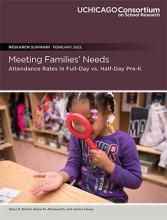Full-day pre-k matters for young learners’ attendance

A new research summary of two UChicago Consortium on School Research studies shows that when more full-day pre-k programs were available to families, students were more likely to enroll in full-day programs and student attendance rates increased. Using pre-pandemic data (2013–2017), these studies used policy changes in Chicago to examine the relationship between half- vs. full-day pre-k and students' attendance.
"As Chicago offered more full-day pre-k, students spent more time in school because of the longer school day, plus higher attendance rates," said Stacy Ehrlich, lead author on the first study. "And because Chicago prioritized full-day expansion in neighborhoods where more Black, Latinx, and lowest-income families lived, those families saw the biggest enrollment and attendance changes—a win for students, families, and educational equity."
These research findings are particularly notable given universal pre-k policy goals of President Biden and a number of governors and state legislators, coupled with the reality that pre-k enrollment has dropped during the COVID-19 pandemic. The findings also point to policies that better support juggling childcare, school, and work—support that families with young children are clamoring for in the early days of 2022.
"Ultimately, our findings point to an opportunity for policymakers to offer quality pre-k programs that promote access and break down barriers for students and families," said Elaine Allensworth, lead author of the second study, "and it's never been more important to break down barriers for families with young children than today."
Key findings front the studies include:
Study 1: District-wide, more CPS students enrolled in full-day pre-k programs from 2012–13 through 2015–16, while enrollment in half-day pre-k declined.
- Full-day pre-k enrollment increases were especially large for Black students, whose enrollment more than quadrupled.
- Attendance rates were higher in full-day than half-day pre-k programs.
- CPS-wide pre-k attendance rates increased, driven by higher full-day attendance rates--particularly notable given that full-day student enrollment never reached more than 25% of total pre-k enrollment.
Study 2. After switching from half-day to full-day pre-k, attendance improved more in North Lawndale schools than CPS-wide, and were significantly higher than at similar schools
These findings are echoed by other researchers. "This research summary on the merits of full-day pre-k programs provides further evidence of the clear pay offs to aligning early care and education programs with the needs of parents," says Julia Henly, Professor in the University of Chicago Crown Family School of Social Work, Policy, and Practice, whose scholarship advances understanding of the economic and caregiving strategies of low-income families.
Henly further explains, "Prior research has revealed the many logistical challenges that parents face, which include orchestrating children's child care around parental work schedules. For parents who work daytime schedules, full-time pre-k can ease transportation challenges that arise when children must be shuttled between multiple part-time arrangements to cover the work day. The important attendance effects found in these studies provides compelling support for funding the expansion of full-time pre-k alternatives, especially in economically disadvantaged communities."
Learn more about the University of Chicago Consortium on School Research, a unit within the University of Chicago Crown Family School's Urban Education Institute.